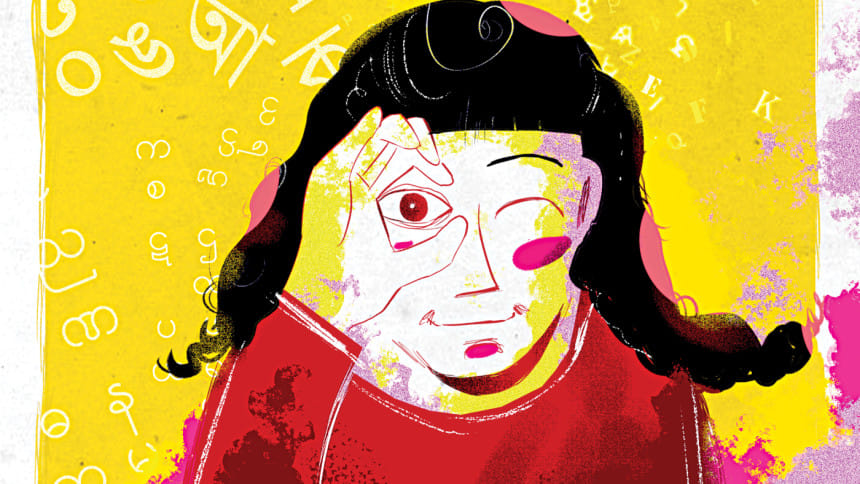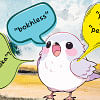Rakhine, Bangla, and English: Freedom in three languages

Growing up in a bicultural household, I was exposed to two languages, two cultures, as a child. I picked up both the languages as my mother tongue—Bangla and Rakhine. Eventually, a third language, English, penetrated my little bubble when I enrolled in school. It soon took over the other two tongues and became the language in which I read my first book, made my first friend at school. It is through the amalgamation of these three languages that my world is shaped.
The Rakhine language is a dialect of the Burmese language. I first boarded a Yangon-bound flight from Dhaka in 1999 at the age of three with my mother to visit her family, who had migrated there in the late 1980s. The very first Burmese I heard was at a Sunday Bazar with my Mingree (maternal uncle). So, for me, Burmese is reminiscent of the long-lost summer vacations of my childhood. It reminds me of my Doh-Doh (Grandma) and the story she told me of the witch who turned a prince into a wax statue, and how a warrior princess saved him from melting under the sun. This language, to me, has a strange connection with the smell of coriander and delicate rice noodles soaked in fish broth, and with the street cart which sold my favourite Burmese dessert: fluffy parathas with condensed milk spread. In this language, I can hear my cousins' excited shrieks as they jump into the chlorine waters of Sukhentha Park near Thaketa Township.
Despite this sense of comfort, I feel more connected to English because of my love for books. As a teenager, every month, I hauled stacks of secondhand books from Nilkhet. I was a lonely child and grew up to become a lonely teenager. I was never very attached to my peers. Consequently, books were all the company I had. They were my playmates as a child and the closest confidantes as a troubled teenager, and through that, books sealed my bond with the language.
Although my mother is not Bengali, Bangla holds a very special place in her heart. She is an avid listener and ardent singer of Rabindra Sangeet; the one who always persuades me to brush up on my Bangla and who ensured my eloquence in it by reading stories of Tagore and Sharat Chandra to me as a child. When I was 15 years old, I participated in a national writing contest. The contestants had to submit a poem or a short story in Bangla on the Liberation War. To my sheer disbelief, I had won that contest! It took me a while to sink into my newfound identity as a child writer but after that, I submitted several short stories to a few Bangla magazines. Since then I became a voracious reader and collector of Manik Bandhapadhay's books; his works have retained my love for the Bangla language.
When we graduated to Class Five, meanwhile, we had a new compulsory subject along with other regular courses: French. I pursued it only for academic purposes; I could not keep up my practise of the language and subconsciously bid adieu to it. But deep within my heart, I am determined to pick up French lessons again.
Language is one of the most powerful tools we can employ to emancipate the most marginalised in our societies. Can you think of a world where everyone could interpret religious texts? Exploitation guised under religion could become a thing of the past. When Martin Luther had translated the Bible into the German language in 1534, which was the language the masses spoke, it had become a revolutionary act—the translation not only helped shape ideas for The Reformation but also had a ground-breaking impact on the lives of common people. It was so radical that it had shattered the absolute powers of the authorities who were once believed to be unconquerable. Such events prove how language empowers one by breaking barriers and ending years of oppression. The goal isn't just to pursue a tongue, but to communicate, and disseminate information and ideas.
I belong to the Rakhine community, and with frequent visits to our ethnic settlements in Kuakata, I realise every day how important it is for the people of our community to get a good grip of the Bangla language. As much as I believe it is fundamental that we should preserve and have the agency to exercise our ethnic languages, we must also be willing to excel in the language in which official work is done. If we do not, people from our ethnic and marginalised communities will continue to substantially lag in many sectors.
This idea was originally propagated by Dr BR Ambedkar when he chose to write The Annihilation of Caste in English, and not in the language of the Dalit communities. Dr Ambedkar had an incredible reason for it. He mentioned, if the upper-class people in the Indian subcontinent contained the words of his book, the debate that the text had spurred would not have reached global leaders. Its impact would not have been this great if it was limited to a local tongue.
Furthering this idea, many Dalit activists today have set up projects which teach marginalised people English. In one of her latest collections of essays titled, Azadi, Indian author, and social activist Arundhati Roy explains how she was frequently treated in a hostile manner for choosing not to write in one of the Indian languages. She reveals how she has been bombarded with questions and blamed for propagating anti-national sentiments for writing in English. Citing a Dalit activist, Roy writes that the English language is used as a tool "to rise up the ladder and become free forever".
Krishti Aung Leona is a graduate student of English Literature at the University of Liberal Arts Bangladesh. She can be reached at [email protected] or her Instagram @krishtiaung.

 For all latest news, follow The Daily Star's Google News channel.
For all latest news, follow The Daily Star's Google News channel. 








Comments